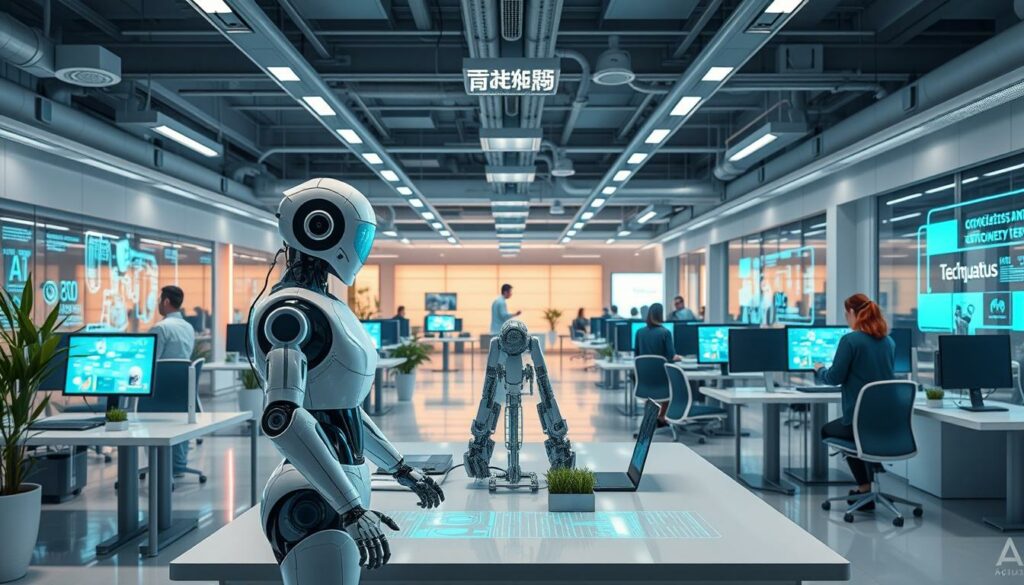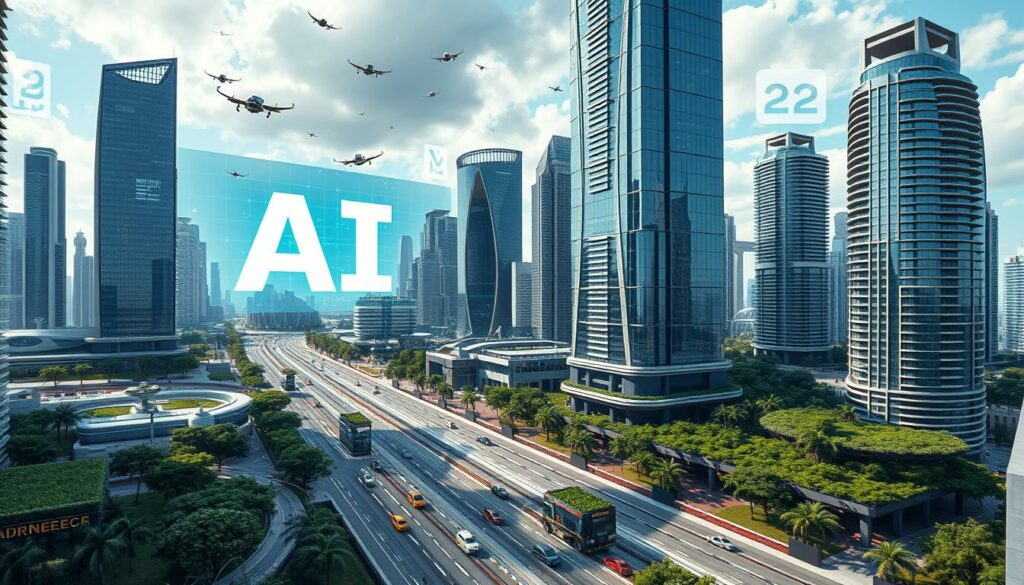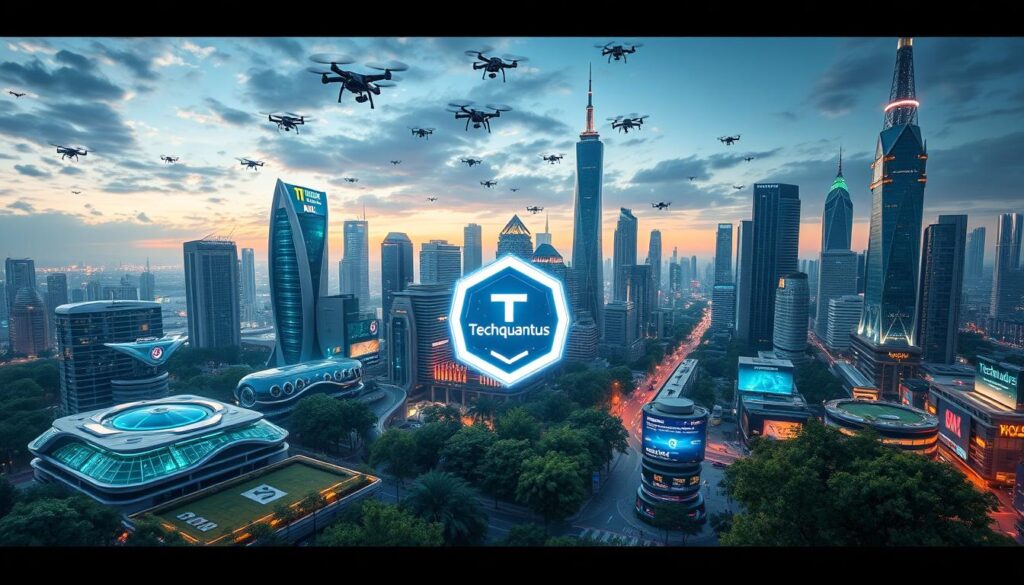The growth of Artificial Intelligence (AI) will change technology deeply in the next ten years. AI will become a big part of many areas of life and work. It will make things more efficient and help with better decision-making, leading to big changes in how we do things.
With new tech, how we use technology will change a lot. This will open up new chances we never thought of before.
AI will take over simple tasks, letting people work on more creative and important tasks. This change will make things run smoother and more efficiently. Understanding AI well will be key to making the most of these changes.
To learn more about how AI is changing different areas, check out this article on AI-powered learning and its effects.
Key Takeaways
- AI will become a big part of many industries in the next decade.
- It will bring big improvements in efficiency and decision-making.
- Companies will find new chances with AI technology.
- AI will change traditional business in big ways.
- Knowing about AI is important for keeping up with tech changes.
The Rise of AI Technologies in the Next Decade
The next decade will see a big leap in AI technologies. This will be thanks to huge improvements in how computers work and new algorithms. These changes will lead to advanced tools that make data analysis, machine learning, and understanding human language better. This will help businesses automate tasks, predict outcomes, and offer personalized services, making things smarter and more efficient.
As future tech grows, companies like Nvidia are leading the way in AI software. For example, Nvidia’s sales of AI hardware jumped by 154% in just one quarter, hitting $26.3 billion. This shows a big move towards AI hardware, making up 88% of Nvidia’s sales. This is much more than the growth in gaming and PC sales, which only grew by 16%.
Experts say Nvidia’s huge market value of $2.93 trillion shows it’s a top player in AI hardware. Yet, Goldman Sachs analysts warn that companies might not make back the $1 trillion invested in AI hardware soon. This is because making money from AI can be tough, and free alternatives are becoming more common. Still, Nvidia is likely to benefit from its investments, with cloud providers making up to $5 for every $1 spent on Nvidia hardware.
AI technologies will have many uses in the future, like in self-driving cars, augmented reality, and robots in warehouses. This means AI will change many industries, affecting jobs, how people shop, and innovation.
As future tech comes closer, it’s important to keep an eye on leaders in the industry. Nvidia is doing well in revenue and is improving its software and SaaS offerings, aiming for a $2 billion annual run rate. Palantir Technologies also saw a 76% stock jump in 2024 and expects to grow its revenue. For more details, check out the insights on AI technologies and the market.
Artificial Intelligence and Its Impact on Industries
Artificial intelligence is changing many sectors, making them more efficient and innovative. It’s bringing big changes in how things work, keeping people safe, and improving customer service. Let’s look at healthcare and the automotive industry closely.
Healthcare Innovations Driven by AI
AI is changing healthcare by making treatments and diagnoses better. With AI tools, doctors can:
- Use data to find diseases more accurately.
- Create treatments that fit each patient’s needs.
- Offer healthcare services through telemedicine.
- Use predictive analytics to predict patient outcomes and prevent problems.
- Perform surgeries with more precision and less recovery time.
Companies like Palantir Technologies are leading the way with their AI Platform. They saw a 27% increase in revenue to $678 million in Q2. This growth is thanks to their focus on healthcare and government processes. It shows how AI can greatly improve industries.
Transforming the Automotive Industry with AI
AI is bringing new innovations and safety to the automotive industry. Big companies are putting a lot into AI to create:
- Self-driving cars that could change how we travel.
- Smart safety features to protect everyone in the car.
- Systems to manage fleets better and cut costs.
- Data analytics to solve traffic problems and improve logistics.
AI is making driving better for customers and making things run smoother. Nvidia is a big name in this area, showing strong competition in AI for cars.
| Company | Quarter | Revenue Increase | Quarterly Revenue | Projected Annual Revenue |
|---|---|---|---|---|
| Palantir Technologies | Q2 | 27% | $678 Million | $2.75 Billion |
| Nvidia | Q2 | 122% | $30 Billion | Not Specified |
Enhancements in AI Algorithms and Machine Learning
Recent advancements in AI algorithms and machine learning mark a new era in tech. Innovations in deep and reinforcement learning are pushing AI to new heights. These improvements have made predictive modeling more accurate, helping with complex decisions in many industries.
The growth of data and better computing power is driving machine learning forward. This helps industries find valuable insights in big datasets. For example, AI chatbots have boosted performance by up to 14% in call centers, showing AI’s big impact.
As companies rely more on data, they face new challenges. These include data privacy, intellectual property, and the risk of spreading false information. AI models also need to avoid bias, which can lead to unfair outcomes. There’s a growing need for rules on AI to handle its spread in areas like finance and healthcare.
Businesses must use AI wisely to stay ahead. This means understanding machine learning and focusing on innovation and ethics. The next decade will see big changes in AI, thanks to machine learning.
For more on AI in tech, check out emerging robotics trends that are changing industries.
AI and the Future of Work
Artificial intelligence is changing the job world. Companies use AI more, which means big changes for workers. This change brings new jobs and the risk of some jobs being taken over by machines. Understanding the AI future of work means knowing the good and bad sides of these changes.
Job Creation vs. Automation: What to Expect
Automation might replace some jobs, but it also creates new ones in tech, data analysis, and keeping AI systems running. This change means more than just new job titles. It means workers need skills to work well with AI. We need more education and training to help people keep up with the changing job market.
AI is changing many industries, like healthcare and finance. There’s a growing need for people who can use AI in new ways. Creating new jobs around AI is key to keeping the economy stable. Programs to help workers get new skills are important to fill the gap.
As companies change, they need to focus on learning and growth. Working together, humans and machines can make things more efficient and innovative. Companies should invest in their workers to keep creating new jobs. This helps workers develop skills that work well with machines.

Ethical Considerations in AI Development
AI development is changing fast, making ethical AI more important. Companies must tackle the tough issues of bias in AI decisions. It’s key to make AI fair to build trust and be accountable.
Data privacy is a big worry with AI. Companies risk losing data or using it wrongly. This is a big problem, especially in countries trying to keep up with fast-changing AI rules.
AI can also spread false information, making us question who’s to blame. When AI makes up facts that aren’t true, it’s hard to know what’s right. This makes it hard to hold companies responsible for AI mistakes.
Working together is crucial. Technologists, ethicists, and regulators need to team up. Companies are unsure if AI will help or hurt their profits. Clear rules for ethical AI can ease these worries and make sure AI is good for us.
Having diverse teams working on AI can make it more ethical. Different viewpoints can spot biases in AI that might not be seen otherwise. For more on AI and ethics, check out this article on the shift in AI views.
Regulating Artificial Intelligence: Necessary Steps
AI regulation is a key topic in tech governance and AI law. As AI becomes more common in our lives, lawmakers must take action. The fast growth of AI brings both good and bad changes. Setting up strong rules can help balance innovation with public safety.
Creating rules that make AI more open and responsible is vital. This means setting clear standards for data protection and making sure AI is fair. The California Digital Content Provenance Standards push for AI to be easily traceable. OpenAI has also started using a special watermark to tell AI-generated text from human-written text. These steps show a commitment to using AI wisely.
There are different opinions on adding watermarks to AI content. Some think it could be hard to do. But, the need for AI rules is clear as AI misuse, like fake identities and copying, happens more often. Schools are changing, with teachers making essays a key part of classes to stop cheating with AI.

| Aspect of AI Regulation | Description |
|---|---|
| Transparency | Ensuring that AI algorithms operate in a way that is understandable to users and regulators |
| Accountability | Establishing guidelines that define responsibilities for AI systems’ decisions and outcomes |
| Data Protection | Creating laws to safeguard user data from misuse by AI entities |
| Algorithmic Accountability | Implementing standards to test and verify AI algorithms to prevent biases and errors |
As we talk more about AI law, we must focus on making rules that protect us and encourage smart AI use. The challenge is to manage the fast-growing tech and its ethical sides well.
AI in Consumer Technology: A Look Ahead
AI is changing how we use technology every day. Smart home devices are getting smarter, making our lives easier. Virtual assistants will soon understand us better, making our interactions more personal.
Future tech will focus more on making things personal. AI will learn what you like, making shopping easier. You’ll see websites that know what you want before you do, making shopping fun.
AI is also changing entertainment. Streaming services will show you shows and movies you’ll love. This means you’ll always find something interesting to watch.
AI is doing more than just making things convenient. In healthcare, it’s helping create treatments just for you. It’s also making medical images clearer, helping doctors diagnose better.
As technology advances, companies need to keep up with what we want. By using AI, they can make things better for us. This means a brighter future for everyone.
| Area of Impact | AI Application | Benefits |
|---|---|---|
| Healthcare | Personalized Medicine | Tailored treatments improve patient outcomes. |
| Healthcare | Medical Imaging | Enhanced image resolution allows for better diagnostics. |
| Finance | Fraud Detection | Simulated fraud scenarios enhance security measures. |
| Retail | Personalized Shopping | AI predictions optimize inventory based on demand. |
| Education | Customized Learning | Learning experiences tailored to individual performance. |
| Entertainment | Content Recommendations | Personalized suggestions keep you engaged with offerings. |
AI and consumer technology will work together more closely in the future. To learn more about AI’s impact on different industries, check out the insights here.
Potential Challenges Facing AI Advancements
Artificial intelligence is getting more advanced, but it also faces big challenges. It’s important to tackle these issues to make sure AI grows responsibly.
Data Privacy Concerns and AI
AI needs a lot of data to work well, which raises big privacy worries. As AI becomes part of our everyday lives, how we protect our data matters more than ever. We need strong rules to keep our information safe while still letting innovation happen.
If we don’t get this right, people might not trust AI, and it won’t be widely used. The European Commission has proposed new laws to deal with these privacy issues. They suggest giving these laws two years to work before they start.
The Need for Explainable AI
AI is getting more complex, and we need AI that we can understand. It’s key to trust AI if we know how it makes decisions. Explainable AI tries to make these decisions clear, solving ethical problems that could happen if we don’t get why AI decides what it does.
In areas like healthcare and finance, where AI makes big decisions, we really need to understand how it works. Some big names in tech are calling for a pause in AI progress until we have strong rules. This shows how worried people are about AI’s hidden workings.
| Challenge | Description | Potential Impact |
|---|---|---|
| Data Privacy Concerns | Increased data collection and potential misuse of personal information | Loss of trust among users and potential legal ramifications |
| Explainable AI | Lack of transparency in decision-making processes | Diminished public confidence and ethical implications in critical sectors |
The Role of AI in Driving Innovation
AI is changing how businesses work and compete. By using advanced AI, companies can make processes smoother and improve their products. This leads to new ways to develop things. With technology moving so fast, companies can create a culture that always looks for ways to get better.
AI will change many parts of business, like making supply chains better and helping in designing products. These changes make things more efficient and help unlock human talent. In a world full of new tech, working well with AI and human creativity can bring big changes to industries.
What does this mean for the workforce? As AI gets better, companies that invest in AI and training will do well. By improving employee skills and changing how things work, businesses can see AI as a key part of their strategy for innovation.
Let’s look at how AI is changing different industries. Here’s a table showing key sectors and their benefits:
| Industry | Innovation Driver | Benefits |
|---|---|---|
| Healthcare | Diagnostic AI | Improved accuracy in diagnosis and personalized treatment plans. |
| Automotive | Self-driving technology | Enhanced safety and reduced traffic congestion. |
| Retail | Predictive analytics | Optimized inventory management and personalized customer experiences. |
| Manufacturing | Automation and robotics | Increased efficiency and lower operational costs. |
| Finance | Fraud detection algorithms | Enhanced security and faster transaction processing. |
Leaders in different fields see AI as a way to get ahead. The world of innovation is always changing. Using AI and its power helps companies stay up-to-date and ready for the future.
Collaborative AI: The Human-Machine Partnership
The world of technology is changing to highlight the power of collaborative AI. People and machines are working together to get better results. This teamwork makes human-machine interaction stronger, letting both sides use their strengths. Humans bring creativity and understanding, while AI offers speed and power, making great AI partnerships that change how we work.
More companies are seeing the benefits of using collaborative AI. For example, those using AI in customer service have seen a 14% increase in productivity. These partnerships make things run smoother and open up new ways to solve problems in different fields.
But, moving to these new ways of working is not easy. Many companies are unsure about AI’s benefits and worry about the cost. Adding new AI tech to old systems can be hard, making some companies hesitate to use it fully. This shows we need ongoing talks and research in AI partnerships to overcome these issues.
Even with challenges, the push for collaborative AI is strong. With better guidance and support, companies can handle the complex parts better. This leads to more innovation and flexibility through better human-machine interaction. The key to collaborative AI is its ability to help everyone involved succeed together.
Conclusion
The future of AI is bright, with big changes on the horizon. These changes will affect many areas of life. It’s important to understand both the good and the bad sides of AI’s growth.
Being aware of AI’s potential and challenges helps us make better choices. This knowledge lets us support responsible use of technology. It also means thinking about how AI should be used ethically.
Events like the Ascension Charity Classic show how tech and sports can bring people together. This event has helped the local economy and raised money for charities. It shows the power of working together for good.
Keeping up with AI’s impact is key. We need to focus on helping all communities, not just some. We must make sure AI doesn’t make things worse for those who are already behind.
Working together is crucial to make AI a positive force. We need to keep talking and sharing ideas. For more on ethical AI and its challenges, check out this link.
FAQ
What role will AI play in various industries over the next decade?
AI will be key in changing many sectors. It will make things more efficient, help with making decisions, and open up new chances. Healthcare and the automotive industry will see big changes thanks to AI.
How will AI impact the job market?
AI might take over some jobs, but it will also create new ones in tech, data analysis, and AI upkeep. People will need to learn new skills to work well with AI in the future.
What are the ethical considerations related to AI development?
There are big ethical issues like biases in AI decisions, privacy worries, and who is accountable. Companies making AI must follow ethical rules to be fair and respect users’ rights. This builds trust with everyone involved.
Why is regulating AI important?
Regulation stops AI from being misused and keeps society safe. It’s key to have rules that encourage responsible AI making. These rules should be clear and make sure AI is open and accountable.
What challenges does AI advancement face regarding data privacy?
Handling a lot of data raises big privacy issues. We need to update laws to protect people’s info while still letting tech progress.
What is ‘Explainable AI’?
Explainable AI means making AI decisions clear. It’s about showing how AI systems make choices. This builds trust and understanding with users and others.
How will AI enhance consumer technology in the future?
AI will change consumer tech with smart devices, virtual helpers, and shopping tailored just for you. As AI gets better, you’ll see more personal touches and easier ways to interact with technology.
How is AI expected to influence innovation across sectors?
AI will push innovation by making things run smoother, improving products, and opening new ways to develop. Companies using AI will have an edge in the market.
What is the concept of collaborative AI?
Collaborative AI means working together with humans and machines. They use each other’s best points to get better results. This teamwork boosts productivity and creativity, leading to more innovation and success.
Source Links
- https://www.bbc.com/news/articles/cm2n0n8mdgeo
- https://www.fool.com/investing/2024/09/07/where-will-nvidia-stock-be-in-10-years/
- https://themarkup.org/hello-world/2024/09/07/how-im-trying-to-use-generative-ai-as-a-journalism-engineer-ethically
- https://www.fool.com/investing/2024/09/07/prediction-wall-streets-first-5-trillion-stock/
- https://www.fool.com/investing/2024/09/07/artificial-intelligence-ai-stock-palantir-nvidia/
- https://www.mdpi.com/2075-1702/12/9/630
- https://riskandinsurance.com/capital-health-creating-a-culture-of-safety-in-health-care/
- https://medium.com/@sahin.samia/why-the-ai-hype-is-slowing-down-a-deep-dive-e10c7952d45c
- https://www.mdpi.com/2076-3417/14/17/8011
- https://www.techradar.com/computing/artificial-intelligence/i-switched-to-a-pixel-9-heres-what-the-iphone-16-needs-to-do-to-win-me-back-and-its-not-what-you-think
- https://www.zdnet.com/article/the-budget-android-tablet-i-recommend-to-most-people-isnt-by-samsung-or-tcl/
- https://www.politics-dz.com/how-artificial-intelligence-supports-marginalized-groups-in-the-labor-market-case-of-people-with-disabilities/
- https://elblog.pl/2024/09/07/the-future-of-ai-balancing-optimism-and-caution/
- https://www.vox.com/future-perfect/370419/chatgpt-schools-ai-cheating-plagiarism-detection
- https://www.nature.com/articles/s41598-024-71604-y
- https://mashable.com/article/family-organizer-app-review
- https://techbullion.com/the-impact-of-generative-ai-on-various-industries/
- https://www.nature.com/articles/s41597-024-03833-9
- https://community.acer.com/en/discussion/712191/when-introducing-my-snid-it-shows-different-model-what-is-going-on
- https://www.webpronews.com/founder-mode-the-leadership-approach-reshaping-silicon-valleys-success-stories/
- https://techbullion.com/a-sign-of-innovation-and-leadership-sharmilas-leading-role-in-enterprise-software/
- https://medium.com/daily-ai-news/why-ai-skills-matter-more-than-experience-in-2024-ed417a712416
- https://www.firstalert4.com/2024/09/07/2024-ascension-charity-classic-underway-questions-mount-around-future-event/
- https://finbold.com/a-0-03-ai-token-could-overtake-major-altcoins-like-avalanche-avax-and-chainlink-link-heres-why/
- Budgeting and Cost Control for IT Projects: My Expert Advice
- Learn How to Manage IT Projects Effectively with My Advice
- I Share My Best Data Backup Strategies Using Cloud Storage
- I Learned About AI Mistakes That Could Change Your Life
- Sustainable & Green Energy Solutions for Next‑Gen Data Centers Trend Report
Related posts:
 How Generative AI is Changing Creative Industries: A Deep Dive
How Generative AI is Changing Creative Industries: A Deep Dive
 Natural Language Processing: How AI Understands and Responds to Us
Natural Language Processing: How AI Understands and Responds to Us
 How AI is Revolutionizing the E-commerce Industry
How AI is Revolutionizing the E-commerce Industry
 The Role of Quantum Computing in Drug Discovery
The Role of Quantum Computing in Drug Discovery
 CISSP Domain 3: Security Architecture and Engineering
CISSP Domain 3: Security Architecture and Engineering
 How to Build Edge AI Solutions for Real-Time Data Analysis
How to Build Edge AI Solutions for Real-Time Data Analysis
